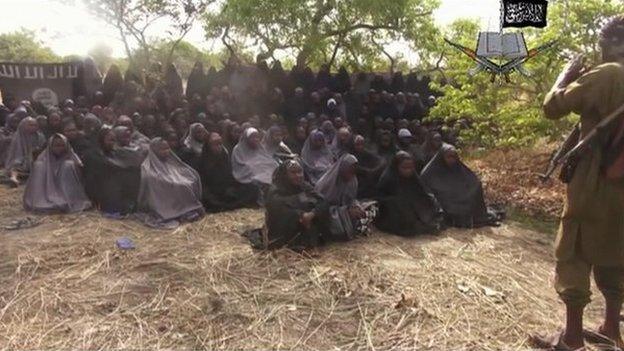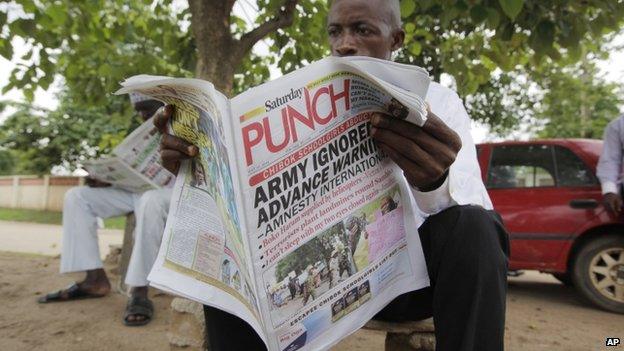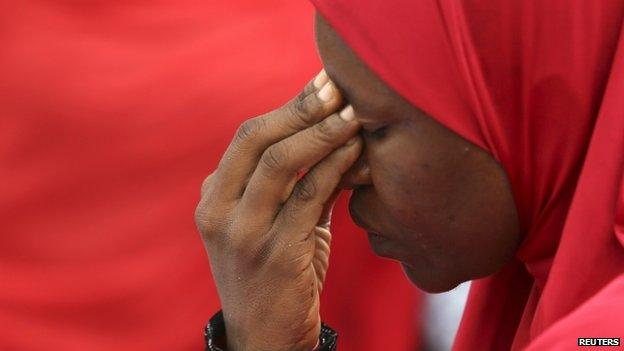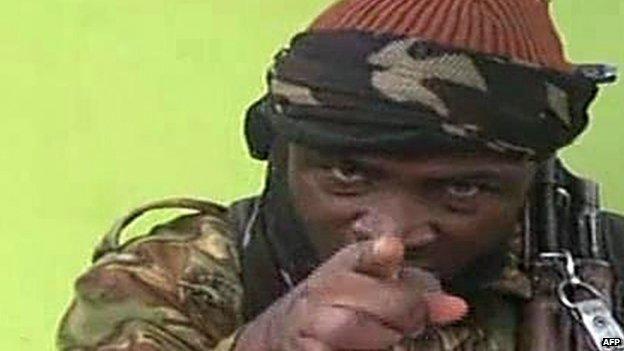Nigeria abductions: Video of girls 'gives me hope'
- Published

A man whose three cousins are among more than 200 schoolgirls being held by Islamist militants in north-eastern Nigeria tells the BBC's Focus on Africa radio programme of his reaction to the emergence of a video apparently showing about 130 of them.
The man declined to give his name because of security concerns for his family.
The girls, a mixture of Christians and Muslims, were taken by Boko Haram fighters on the night of Monday 14 April from their school hostel in the town of Chibok in Borno state.
In the new video a group of them is shown reciting Koranic verses, after apparently converting to Islam. Boko Haram's leader then offered to swap the girls who had not converted for imprisoned militants.
Testimony:
When I heard about the video release I was hoping to see one or two or all of my missing relatives.
But it was difficult for me [looking at the pictures] to see if my cousins were among the girls on the video.
Their dresses were different from what I am used to, the voices [of girls on the video] were different and the environment was different.
If possible I intend to print pictures out from the video to see if my relatives can recognise any of them.
The emergence of the video gives me hope that they are still alive, but in other ways it has made me more stressed.
I was very emotional and the tears were dropping from my eyes.
I was told that some of the girls were deprived of their rights and forced to convert to another religion by force.

The plight of the girls is being followed in Nigeria and across the world

Women have been protesting for nearly two weeks in the capital, Abuja, about the abductions
I have no problem with what a person chooses to do, but I do have a problem if someone is converted to a religion by force.
That is terrifying - I would never want to force someone to convert to my religion [Christianity].
What I am saying is that these girls are the children of the masses.
They do not have any say in the government; they are not the children of politicians or the children of government officials.
We have never had any trouble with Boko Haram or militants before. We are peaceful and loving people.
I appeal to them to release these girls.
I want to say that we have forgiven [the militants] 100%, even thought they have abducted our daughters for close to a month subjecting them to some anxieties.
But we still say that the abductors are human beings and we are begging them to have mercy on these girls so that they can be the mothers of tomorrow.
Dialogue
One day they are expecting to get married and will give birth to at least a couple of children who will be available and useful to society. One day the gunmen themselves may need the help of the children [of] these girls.

Some relatives want the government to talk to the militants, whose leader is seen here in the 12 May video
They are innocent children who do not know anything.
What I want the government to do is employ diplomacy in all the decisions it takes.
There are people across the globe who may know these gunmen. Let's talk to these people in a polite way, in a good and peaceful manner.
Let them first embrace the spirit of forgiveness because if that is done they, the militants in the bush, will be able to come back home and be united with their relations.
And the people of Borno state and the rest of Nigeria will embrace them. They will receive complete forgiveness.
That is what I want the government to do. If that fails, let them try other alternatives.
But dialogue is one of the most important aspects.
